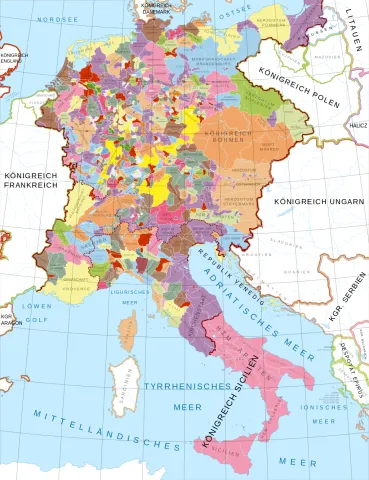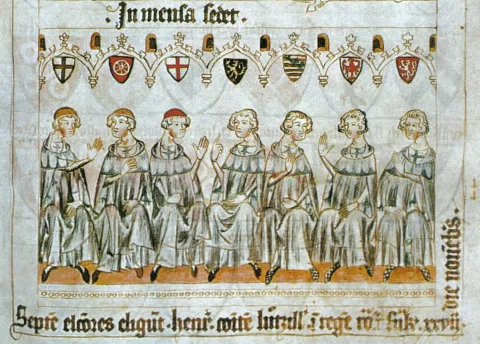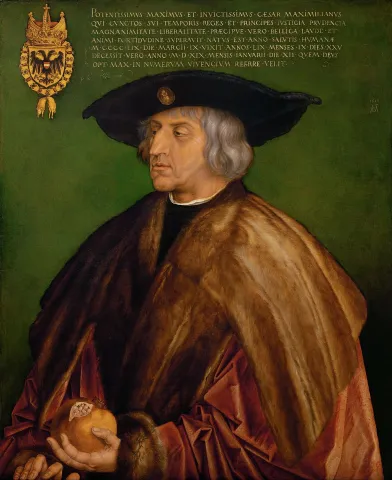The Sovereign's Election
June 28, 2022
The Holy Roman Empire (Latin: Sacrum Romanum Imperium; German: Heiliges Römisches Reich, later: Heiliges Römisches Reich deutscher Nation) was one of the largest, most successful and longest-lasting political entities in Europe. Founded by the German Emperor Otto the Great in 962, who wanted to continue and revive the empire of Charlemagne, who in turn considered himself as the right successor of the Roman Empire (translatio imperii), it continued for more than eight centuries until its dissolution in 1806 during the Napoleonic Wars. At the high-point of its territorial scope around 1200, it covered the whole or at least considerable areas of the contracting states AT, BE, CH, CZ, DE, FR, IT, LI, LU, NL, PL and SI.
Wikipedia educates us that
From the accession of Otto I in 962 until the twelfth century, the Empire was the most powerful monarchy in Europe. Andrew Holt characterizes it as "perhaps the most powerful European state of the Middle Age". Centralized control dwindled around the 1250s.
With that history of success and true European ambition, it is nothing but a fair proposition that the Holy Roman Empire is the proper predecessor of the modern European Patent Organisation. Unlike the EU, the Holy Roman Empire covered states like Switzerland and Liechtenstein, and likewise unlike the EU, its constitutional order resembles one of a Wahlmonarchie (elective monarchy) rather than the one of a federation of souvereign states with a considerable number of democratic elements (e.g. a democratically elected European Parliament). The main difference between the medieval Holy Roman Empire and the European Patent Organisation is that the former used to be a mixture of monarchy and aristocracy whereas the EPO rather resembles a mixture of monarchy and bureaucracy. But the key features are the same: In the Holy Roman Empire, the sovereign (the Kaiser / Emperor) was elected by the Kurfürsten (prince-electors), whereas today the sovereign (the President) is elected by the Administrative Council. Both can be fairly represented by the following picture:
As the EPO’s sovereign-electors meet again this week, most likely to confirm and praise the President they elected previously, let us have a closer look into the workings of a historic election in the Holy Roman Empire.
Traditionally, the Emperor was elected by and among the prince-electors, and equally traditionally, the election came at a huge price. The prince electors demanded imperial privileges, attractive positions at Court, and, above all, money. One of the most famous stories in this regard is about the Habsburg King Maximilian I, who only became elected as German Emperor because he was lavishly funded by Jakob Fugger “the Rich”, a major German merchant, mining entrepreneur, and banker from Augsburg. Fugger in turn then received further imperial privileges, e.g. he had an almost monopolistic hold on the European copper market. Having financed the rise of Maximilian I, Jakob Fugger made considerable contributions to secure the election of the Spanish king Charles I to become Holy Roman Emperor Charles V. He also funded the marriages which later resulted in the House of Habsburg gaining the kingdoms of Bohemia and Hungary. Wikipedia reports Fugger’s net worth at the time of his death as approximately 2 million guilders, which allowing for inflation is the staggering amount of approximately US$ 328 billion (in 2021 dollars), or equivalent to 2% of the GDP of Europe in 1525. So it was not overly difficult for him to be generous with “his” Emperor and burn the Emperor’s IOU’s in his chimney, when Maximilian humbly asked for a cut of his debts.
Maximilian, in turn, was constantly in debts, because he needed money not only for diplomacy, but also for his lavish lifestyle which was typical of a Renaissance leader. He explicitly described in one of his books (Der Weisskunig) his pleasure in a "köstlich hochzeitlich mal mit manicherley trank aus teutschen, welschen, kriechischen, hispanischen und heidnischen landen, auch mit vil seltsamer wunderlicher speiß", i.e. a big party with lots of booze from all over Europe that the Pope arranged for him on the occasion of one of his weddings. Yet another reason of his chronic dire straits with finances were the many wars that he started, particularly in the East. His soldiers seemed less happy with this feature of his. There is even one report of them going on strike when Maximilian wanted to engage them in a winter campaign in Hungary. His foot troops were exhausted by the preceding campaign and did not want to get exposed to coldness, snow and yet more fighting; hence they demanded a doubling of their salary, a demand that Maximilian could neither understand (he loved fighting and did not mind snow) nor fulfill. Nonetheless, it appears that he still enjoyed more trust by his soldiers than the present EPO President by his examiners, if this survey is to be believed.
So Maximilian I became German Emperor in 1508. He then continued his policy of appointing befriended noblemen into new positions, e.g. by appointing the family Radziwill as dukes, arranged multiple weddings of his progeny with the successors of the thrones in Bohemia and Hungary to enlarge Austria’s territory, and so on and so forth. As early as from 1488 through his reign as sole ruler, Maximilian had practiced a policy of brokerage, acting as the impartial judge between options suggested by the prince elects. In particular, a new organ was then introduced, the Reichskammergericht, i.e. a court that was to be largely independent from the Emperor. Alas, such a court is dearly missed in today’s Eponia, which is more akin to the medieval Holy Roman Empire before 1495. But why change such a successful system?
When new sovereigns entered into power, they of course brought their Hofstaat (Court) with them or appointed good friends into major positions such as the Truchsess (Steward), the Marschall (Marshal), the Schenk (Cupbearer) and the Kämmerer (Chamberlain). Over time, these honorary positions were increasingly reserved to the prince elects, at times even on a hereditary basis. Today, people in equivalent positions bear more sober names such as VP 1, 2, 4 and 5, but it still happens that they have previously been among the prince-elects. One may question whether a system that is more built on competence for the position, i.e. a meritocracy, might better serve the purposes of the European Patent Organization, but let us not get such modernistic thoughts in the way of our historic contemplations. The Holy Roman Empire thrived with such a system for more than 800 years.
One legal problem about the Holy Roman Empire plagued the lawyers, though. Was the Empire a monarchy or an aristocracy? The empire could never be clearly assigned to one of the two categories, since the power to govern the empire was neither in the hands of the emperor alone, nor in the hands of the electors alone, nor in the hands of the entirety of an association of persons such as the Reichstag. Rather, the empire combined features of both forms of government. Thus, in the 17th century, Samuel Pufendorf concluded in his work De statu imperii on the state of the empire, that the empire was sui generis (of its own kind) "ein irregulärer und einem Monstrum ähnlicher Körper" (irregulare aliquod corpus et monstro simile / an irregular body resembling a monstrosity), which, according to wikipedia, Karl Otmar von Aretin described as “the most frequently cited sentence about the imperial constitution from 1648 onward”.
I better stop here. History contains many interesting lessons for us, and sometimes I am afraid that we have not progressed very much since the middle ages. Remember that Maximilian I was also the Emperor under whom Martin Luther and the reformation came up (starting in 1517). Reforms to the European Patent Organization are, at least in my humble opinion, likewise needed. There should be a strict separation between the organ that elects and is supposed to control the President, and the administration of the European Patent Office. In particular, it should not be allowable that members of the Administrative Council later become senior members of the EPO. EPO management should be elected based on merits, not political or financial favours. There should be a strong embedding of the European Patent Organisation in a constitutional order that guarantees fundamental rights to its employees. And there should be an independent court watching over the Administrative Council and the Office Management and making sure that both comply with this constitutional order. I know that some people will say this is a dream with no chance of being realised any time soon. But I stay with Luther, who wrote
Ich kann nicht anderst/ hie stehe ich/ Got helff mir/ Amen.
You may also like


















gasteig
a very interesting point of view and an enlightening presentation of the EPO! Putting aside not electing the management or not controlling the controller (the council), would you mind telling to a much less experienced lawyer like me what you disapprove and dislike most of the daily handling of patent applications by the EPO, what attitudes or rules you consider inappropriate, wrong or unfair when you are seeking a patent release for one of your clients? As you see a high distortion and damage induced by the EPO to the patent system in Europe, I would like to understand how this practically results in incorrect or possibly unlawful decisions daily taken by EPO staff when processing instances from applicants. I would appreciate this very much in order for me and others, to better prepare a patent request before the EPO and what response to expect. Grateful for any insight from you!
Attentive Observer
Thanks Thorsten for once more an enlightening article. In the Middle Ages such a behaviour might have been tolerable, although I am not sure of it, but in this day and age such an attitude is bordering on criminal. The head of an office put in charge of restoring social peace and who is insulting his own staff should be dismissed at once, even if he should have accomplished positive things, which for the person concerned is certainly not the case. The level of cross border “fertilisation” between members of the AC and later high ranking “managers” has reached an absurd level. Not only the appointment of the Benoît 1th, VP5, but also some PD in DG5 are prime examples of this kind of collusion. No wonder the latter claimed in the OP of G1/21 that the EPC can be amended by secondary legislation. Even if it would be true, certainly to the point that the net result is trodding on the EPC and actually changing its spirit and scope. It should be made clear, but by whom, that immunity does not mean impunity! As it is said in German: die Stecken alle unter der gleichen Decke! Or in French: passe moi la rhubarbe, je te passe le séné! That the representative organs of the users, to start with epi, do not utter any concern is disturbing to say the least! Are those people not realising that they are sawing the branch on which they are sitting?
History Buff
Great blog entry, a very pleasant read. As formulated by Gianbattista Vico: history is made of cycles and counter cycles of growth and decay. Events and situations cyclically repeat, even centuries apart. The EPO is the HRE of the present cycle, only less Holy, less Roman, and possibly more barbaric.
MaxDrei
Attentive, Thorsten, I'm going to be provocative again. Attentive, lament that "the users" don't kick up more of a fuss about the demise of the Rule of Law. But just as the AC members are seduced by money, so too are the heaviest users of the EPO. Their servants, the patent attorney profession, know which side their bread is buttered, and the profession as such is never going to bite the hand that feeds it. The advent of the UPC sets up the lobbyists for corporate interests to explain to the politicians that the EPO is just another administative organisation that hands out certificates whose only use is to enable them to haggle with each other over incremental degrees of their freedom to use innovations (and in the last resort settle their differences in court). In time, an EPO AI will perform all the admin functions involved in issuing such certificates. He who pays the EPO piper calls the tune. The corporation which files a patent application at the EPO will decide for itself how much "quality" it wants in its granted patent. I mean, it is not as if the outlaw EPO can deprive any human being of their liberty, is it? So, shoulder shrugs all round, in Brussels and Berlin. For them, it's just too difficult and tiring, to resist the power of the lobbyists. These days, as the sayings go, it's every man for himself and might is always right. Worse, as Margaret Thatcher opined "There is no such thing as society". The EPO had a good run but now, thanks to new technology and erosion of respect for the Rule of Law, its best days are (inevitably) behind it. How can we convince enough of the voters that society exists and that, for society, the ever-shrinking Rule of Law is precious and, once lost, will never be regained. I have no idea. Do you? And Thorsten, you mention above a "court" but I wonder, did that amount in any meaningful way to a "Rule of Law"? I'm sceptical.